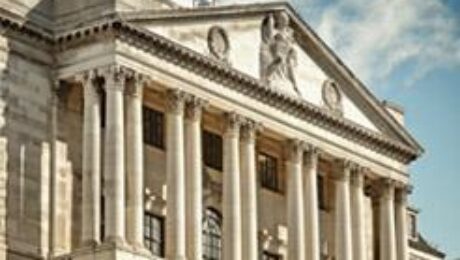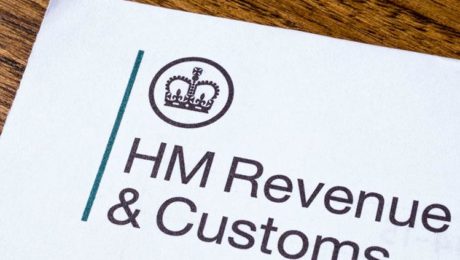Bank of England leaves interest rate at 5.25%
For the first time in over a year, the Bank of England has maintained the current interest rate at 5.25%
The decision to hold the base rate comes after the minimal drop in inflation to 6.7%. The monetary policy committee voted by a majority of 5–4 to maintain bank rate at 5.25%. Four members wanted to increase the interest rate by 0.25%, to 5.5%.
This means that HMRC interest rates will remain at 7.75% until at least November when the Bank meets again.
The Bank also indicated that it expects inflation to return to the 2% target in the medium term, but unlike last month’s report, did not put a timeframe on its earlier estimate of Q2 2025.
‘Monetary policy will need to be sufficiently restrictive for sufficiently long to return inflation to the 2% target sustainably in the medium term,’ the Bank noted. ‘Further tightening in monetary policy would be required if there were evidence of more persistent inflationary pressures.’
CPI inflation is expected to fall significantly further in the near term, reflecting lower annual energy inflation, despite the renewed upward pressure from oil prices, and further declines in food and core goods price inflation, the Bank said. Services price inflation, however, is projected to remain elevated in the near term, with some potential month-to-month volatility.
Nigel Green, chief executive of deVere Group, the financial advisory and asset management firm, said: ‘The central bank policymakers should go further and commit to stopping the hiking agenda, rather than just pausing it.
‘The battle against inflation is gradually being won. Further stifling economic growth by resuming rate rises next time around will lead to yet more decline in investment, entrepreneurial activity, development, innovation – and therefore jobs and a decline in overall economic well-being.
‘As such, this is now the time for the BoE to stop – not pause – interest rate hikes.
‘The time lag for monetary policies is notoriously long. It typically takes about two years for the full effect of rate hikes to filter fully into the economy – and this is where we are.’
The impact of soaring interest rates has had a punitive impact on businesses exposed to high borrowing.
Nils Kuhlwein, partner at Kearney, said: ‘While the effect of rising interest rates on UK plc is well-known, closely watched, and priced into future risks, successive base rate jumps over recent years have turned the screw on these companies.
‘Recent Kearney research into companies which are unable to meet interest obligations through operating profit – known as ‘zombie companies’ – shows that if struggling UK companies were forced to refinance at twice the interest rate they enjoy currently, the share of this ‘walking debt’ amongst UK business would increase by almost 10%.
‘Given that many of these companies currently see rates as low as 2-3% on some debt, this is hardly unreachable.’
- Published in Interest Rates
HMRC raises late payment interest from 21 February
HMRC will raise interest rates on tax debt to 6.5% from 21 February following latest increase in base rate
The late payment and repayment interest rates applied to the main taxes and duties that HMRC currently charges and pays interest on will rise to:
- late payment interest rate — 6.5% from 21 February 2023
- repayment interest rate — 3% from 21 February 2023
This means that the late payment interest rate will increase by 0.5% to 6.5% from 21 February. The rate last increased to 6% on on 6 January. This is the highest rate since the start of the financial crisis in November 2008.
Late payment interest is payable on late tax bills covering income tax, National Insurance contributions, capital gain tax, stamp duty land tax, stamp duty and stamp duty reserve tax. The corporation tax pay and file rate also increases to 6%.
Repayment interest will also be increased from the current 2.5% rate to 3%.
Corporation tax self assessment interest rates relating to interest charged on underpaid quarterly instalment payments rises to 5%.
The interest paid on overpaid quarterly instalment payments and on early payments of corporation tax not due by instalments rises to 3.75%.
- Published in HMRC, Interest Rates
HMRC piles pressure on taxpayers behind on payments
A further increase on interest paid to HMRC for late payment of taxes will hit taxpayers who are not up-to-date, warns Blick Rothenberg
Nimesh Shah, CEO at the firm said: ‘Following another Bank of England base rate to 1.75%, HMRC has confirmed that it will raise its interest rates on late tax bills to 4.25% on 23 August – a level not seen since January 2009.’
He added: ‘Since the start of 2022, the HMRC’s interest rate has increased by 1.5% – that’s the equivalent of an extra £225 per annum on a £15,000 tax liability. On the same £15,000 tax liability, you would suffer almost £650 of interest per annum.
‘With continuing rising costs rising across the board, HMRC have hiked up interest on late tax payments at the latest opportunity. It sets a worrying trend for some taxpayers who are struggling to pay their outstanding taxes, against the backdrop of other rising costs.
The threat of further interest rate rises this autumn, coupled with rising inflation, will likely see further increases in HMRC rates.
Shah said: ‘The worst is yet to come on this front, with some economists projecting the Bank of England could decide to increase the base rate to 2.5% by the end of 2022 – this could see HMRC increasing their interest rate on late paid tax to 5% by the end of the year.
‘Taxpayers who have outstanding tax liabilities should be mindful to settle as much as they can afford before there are further rate rises.
‘HMRC have also finally increased the repayment supplement rate by 0.25% to 0.75% – the first increase in this rate in over a decade. It’s quite shocking that HMRC have quickly increased the rate on late paid tax by six times the amount the equivalent repayment interest rate has gone up by this year.
‘HMRC’s meagre 0.75% repayment supplement rate means there is not any great incentive for HMRC to release repayments. There continues to be one rule for money owed to HMRC and another for taxpayers who are due a refund. Many taxpayers have seen significant delays to repayments over the last 12 months, but HMRC can continue to drag their heels with little cost to the Treasury.’
- Published in HMRC, Interest Rates, Tax return
Interest rate hits 1% as Bank tries to curb inflation
The Bank of England has raised the interest rate by 0.25% to 1%, marking the highest rate for 13 years
The rate has gone up by 0.25% from the current 0.75%, and is likely to continue to rise over the next 12 months. The Bank expects the base rate to increase to 2.5% by mid 2023, falling to 2% at the end of 2024.
The current 7% rate of inflation is creating an intensifying cost of living crisis with soaring electricity and gas prices. CPI inflation is expected to rise further over the remainder of the year, to just over 9% in 2022 Q2 and averaging slightly over 10% at its peak in 2022 Q4. However, the Bank then expects inflation to drop back to 2% in 2024.
‘Global inflationary pressures have intensified sharply following Russia’s invasion of Ukraine. This has led to a material deterioration in the outlook for world and UK growth,’ the Bank said.
These developments have exacerbated the combination of adverse supply shocks that the UK and other countries continue to face. Concerns about further supply chain disruption have also risen, both due to Russia’s invasion of Ukraine and to Covid-19 developments in China.
Martin Beck, chief economic adviser, EY Item Club said: ‘There is a bit of difference of view in our forecast and what banks are expecting. We do not think there will be a further rise this year, but banks expect 2% rate. What is currently an inflationary problem may prove to be deflationary in time.
‘There are plenty of examples of central banks tightening too fast in the past. We think they will take a more cautionary approach. The Bank can vary the interest rate but could also print money – quantitative easing. But when interest rate reaches 1% the Bank said it would start selling bonds back to the market, but quantitative tightening is not something the Bank has done before so they will want to take a cautious approach.’
Alpesh Paleja, CBI lead economist, said: ‘Another rise in interest rates is warranted, given the persistence of high inflation. However, the Monetary Policy Committee are walking an increasingly fine line.
‘Further action to curb price pressures needs to be weighed against the increasing need to protect growth, particularly in light of a historic cost-of-living crunch. Households are feeling it and so are businesses, with cost pressures across the board.
‘While monetary policy is the appropriate first line of defence in tackling inflation, government needs to take further action to shore up the broader resilience of the UK economy. In the near-term, higher inflation will hit poorer households hardest, so support measures for this group will need to be kept under review. Over the longer-term, securing greener energy supply and a relentless focus on raising potential growth will bolster our ability to withstand shocks and further price pressures.’
Paul Clifford, regional CEO at Azets, said: ‘This is the first time in 13 years that the UK base rate has been at 1% – many businesses and the 1m-plus householders on variable mortgage rates aren’t used to seeing a continuous rise in borrowing costs and the impact that has on budgets.
‘This is also the fourth rise in half a year, from 0.25% in December.
‘The interest rate rise, whilst still historically low, will now place additional repayment burdens on borrowers and have a knock-on impact on businesses as spending is reined in, with SMEs likely to be hit hardest.’
- Published in Interest Rates, Uncategorized



